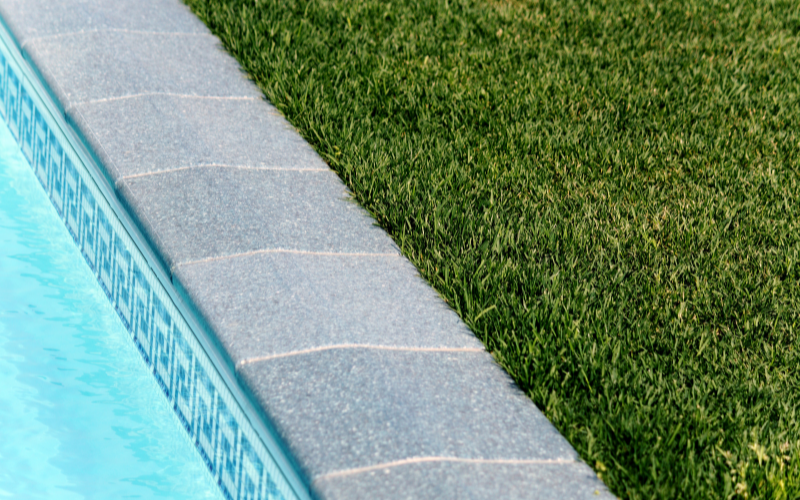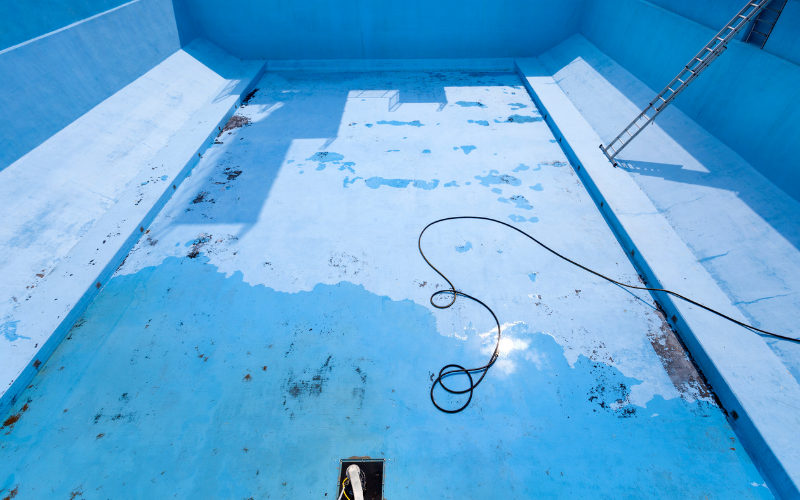Nothing makes summer great like a backyard swimming pool. It’s a great way to beat the heat and still get some exercise. Still, if you have a backyard pool, you may worry about the pool water’s effect on your lawn.
You may be asking yourself “will swimming pool water kill grass” or “can I drain my pool water on the lawn?” Keep reading, because we’ve got answers!

Will Chlorine Pool Water Kill Grass?
Many backyard pools have cement surrounding the pool area. More modern pool designs choose to plant turf right up to the edge of the pool. This gives the pool a more natural look and is softer on bare feet than hot cement.
If you have an above-ground pool, it’s likely sitting on a lawn. Both above-ground pools and pools that have turf growing close to it are in the pool’s “splash zone.” You can try to keep the pool-play gentle, but splashes will occur.
Fortunately, chlorine pool water splashes typically are ok for lawns. As long as your lawn is in healthy condition and your pool is not over-chlorinated, the grass can handle a few splashes.
So if you’re watching your children splash worrying “will chlorine pool water kill grass?” You can relax. While chlorine is a noxious chemical, when it’s diluted enough to be safe to swim in, it’s also safe for grass.
The grass is pretty hearty, as long as you’re not splashing pure chlorine onto it, it should be fine.
Related Article: What Kills Grass? The Complete Guide

Can I Drain My Pool Water On The Lawn?
Pools are great, but sometimes you have to do maintenance. When it’s time to do pool repairs, you have to drain the pool. The lawn seems like a good choice, right? Surely, the ground can handle all the water, but will all that swimming pool water kill the grass?
While splashes of pool water will not harm your grass, a high volume of pool water can. If you want to drain your pool in a way that is safe for plants, you need to dilute it.
The proper chlorine concentration to drain a pool onto a lawn is 0.1 parts per million. For perspective, the recommended chlorination concentration for swimming is 1.0 to 3.0 ppm. If you want to drain your pool on the lawn, you will need to significantly dilute the pool.
Another risk of draining your pool water on your lawn is you run the risk of flooding. Too much water in your lawn at once can drown the roots of the grass and attract mosquitos. Chlorine or no, a high volume of water hitting your lawn all at once can kill a lawn.
To avoid flooding, we suggest draining your pool in intervals. This can take multiple days, but pool drainage should only occur every 5-7 years. Be patient with this process, your lawn will thank you!
Can I Reuse Pool Water To Water My Lawn?
Draining the pool seems like such a waste. Wouldn’t it be so much better if you could reuse the water for your plants? Since the lawn can handle splashes from the pool, you think it could be watered with pool water, right?
Well, yes and no. You can’t take freshly chlorinated pool water and use it on your plants. The high levels of chlorine are bad for plants. If you want to re-use your pool water, you have to do it the right way.
The process of properly de-chlorinating a pool takes several days. While pool drainage should only happen once or twice a decade, backwashing occurs much more frequently. Backwashing typically produces 75 gallons of water that can be used to water salt-tolerant plants.
Some salt-tolerant plants include:
- Oleander
- Rosemary
- Bougainvillea
- Texas Ranger
- Olive
- Desert broom
- Saltbush
- Aloe
- Deer grass
Additionally here is a list of salt-sensitive plants. If you have any of these in your garden, do not water them with reused pool water.
- Fruit trees
- Roses
- Jasmine
- Hibiscus
- Willow
- Jojoba
Additional Risks of Over-Chlorination
The main takeaway when it comes to asking, “will pool water kill grass,” is it’s all about chlorine levels. If you notice that the grass is dying where water splashes: you need to check the chlorination of the pool.
Over chlorination in pools can cause ailments to humans such as:
- rashes
- coughing
- nose and throat pain
- eye irritation
- agitated asthma
It is important to maintain proper chlorine levels in your pool for the health of both people using it and the surrounding plants.
In Conclusion
Pool water is perfectly safe for grass in small levels. If you want to drain your pool onto your lawn, make sure to properly dilute the chlorine level. Be careful not to flood your lawn while draining, because that can kill the grass. If you want to reuse your pool water to irrigate plants, make sure you only use it to water salt-resistant plants.
No need to fear the cannonball!


Thanks for this informative article! I have an above the ground pool that I’m trying to drain for the winter. I haven’t keep up with the chlorine or algaecide for the past few weeks, so I have a buildup of algae in the water. Will the algae in the water affect my lawn? Should I add algaecide before draining it, or just empty it into the storm drain? Please let me know what you think. Thanks!
Hi Carlos,
I think the best approach would be to connect a hose to the pool and allow it to drain into a location that isn’t going to affect any vegetation. My local city states that it’s ok to drain a pool into the ground or into a storm drain without breaking any rules or causing any pollution. This might be one thing you should check on. As for algae harming your lawn, I don’t think it would be a problem. I’ve drained a spa onto my lawn a few times, and it’s been fine. But I did test the water first to make sure the chemicals had completely gone.
Thanks for the question.
Tom.